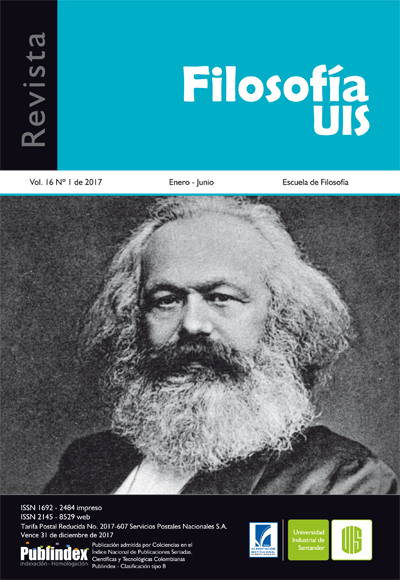Hegel, the free trader vulgaris. A marxian reading of the second section in Hegel's third part of his Encyclopaedia of the Philosophical Sciences
Published 2017-09-11
Keywords
- Hegel,
- Marx,
- Encyclopaedia,
- Capital,
- free trader vulgaris
How to Cite
Copyright (c) 2017 Revista Filosofía UIS

This work is licensed under a Creative Commons Attribution 4.0 International License.
Abstract
The aim of this paper is to make a Marxian reading of the second section in Hegel’s third part of his Encyclopedia of the Philosophical Sciences: The objective spirit (Geist). In the first section, it discusses the importance of studying Hegel’s thoughts on economy. The second one illustrates the way authors, both Marx and Hegel, see simple circulation. The last one approaches developed circulation. Findings suggest that Hegel matches with Marx’s description of the free trader vulgaris, as he put it on his book Capital I.
Downloads
References
Alarcón, J. (2010). La sociedad política, el problema del Estado en Hegel. Signos filosóficos, (24), 49-70.
Alznauer, M. (2012). Ethics and History in Hegel´s practical philosophy. The Review of Metaphysics, (3). 581-611.
Anders, B. (2014). Labour Against Capitalism? Hegel’s Concept of Labour in Between Civil Society and the State. Culture Unbound: Journal Of Current Cultural Research, 6, (1), 113-124 (1), 113. doi: 10.3384/cu.2000.1525.146113
Avineri, S. (1972). Hegel’s Theory of the Modern State. Cambridge: Cambridge University Press.
Boldyrev, I. & Hermann-Pillath, C. (2013). Moral sentiments, institutions and civil society: What can Hegel contribute to Sen’s theory of justice? Review of social economy: Publication of the association for social economics, 71 (4), 502-525.
Buenaga, O. (2014). “Hegel y el derecho privado. La persona, la propiedad y el contrato”. Universitas Revista de Filosofía, Derecho y Política, (20), 27-49.
Cristi, R. (2005). Hegel on Freedom and Authority. Cardiff: University of Wales.
Cristi, R. (1978). Posesión y Propiedad en la Filosofía del Derecho de Hegel. Revista de Filosofía, 16 95-109.
Cristi, R. (2007). Propiedad y derechos subjetivos. Anuario Filosófico, 40 (1)19-45.
Derrida, J. (2005). De la gramatología. México: Siglo XII editores.
Dri, R. (2000). La filosofía del estado ético. La concepción hegeliana del estado. En La filosofía política moderna de Hobbes a Marx. Buenos Aires: CLACSO.
Duncan, S. (2015). Hegel on Rectitude and ‘Virtue as Such’. Southern Journal of Philosophy, 53(4), 405-426. doi: 10.1111/sjp.12153
English, W. (2013). Locke, Hegel and the Economy. Society, 50(5), 468-471. doi: 10.1007/s12115-013-9691-8
Filipe, C. (2014). Freedom and Solidarity: Some Remarks in Light of the Contemporary Reception of Hegel. Ethic@:An International Journal for Moral Philosophy, 13(1), 175-187. doi: 10.5007/1677-2954.2014v13n1p175
Foucault, M. (1996). La verdad y las formas jurídicas. Barcelona: Gedisa.
Garrido, J. (2016). Marx y los signos de una época. Ideas y valores, 65(162), 233-259. doi: 10.15446/ideasyvalores.v65n162.43351
Giusti, M. (2013). ¿Se puede prescindir d la Ciencia de la Lógica en la Filosofía del Derecho de Hegel? Areté: Revista de Filosofía, 25 (1), 45-60.
González, E. (2013). De la explotación económica visible y la invisible. Alegatos Revista Jurídica de la Universidad Autónoma Metropolitana, (85), 751-760.
Hegel, G. W. R. (2005). Enciclopedia de las Ciencias Filosóficas en compendio. Madrid: Alianza.
Hegel, G. W. R. (1993). Fundamentos de la Filosofía del Derecho. Madrid: Libertarias-Prodhuri.
Hayek, F. (1952). “Comte and Hegel”. En The Counter-Revolution of Science. Estudies on the abuse of reason. Glencoe, Illinois: The free press.
López, L. (2014). El concepto de ideología en el Marx maduro. Isegoría, (50), 123-142.
Marx, K. (1973). Contribución a la Crítica de la Economía Política. Moscú: Progreso.
Marx, K. (2010). Crítica de la Filosofía del Estado de Hegel. Madrid: Biblioteca nueva.
Marx, K. (1952). El Capital (Volumen I). México: Fondo de cultura económica.
Marx, K. (2013). Manuscritos de economía y filosofía. Madrid: Alianza.
Merrill, D. (2014). Hyman Minsky, Hegel and the Ethics of the Job Guarantee. Homo Oeconomicus, 31(1-2), 11-28.
Merril, D. (2015). The Concept of Welfare: Politics, Ethics and Economics: Economic Welfare as Ethical Concept and Economic Policy.International Journal of Social Economics, 42(5), 434-446.
Molina, C.(2012). Aportes de Hegel al debate contemporáneo sobre la sociedad civil. Revista de Filosofía UIS, 11 (2), 47-61.
Ordóñez, V. (2015). Marx en perspectiva: el no-dinero como productor de valor. Astrolabio. Revista internacional de filosofía, 1729-35.
Palermo, G. (2016). Power, Competition and the Free Trader Vulgaris. Cambridge Journal Of Economics, 40(1), 259-281.
Popper, K. (1992). La sociedad abierta y sus enemigos. Barcelona: Paidós.
Popper, K. (1973). Miseria del historicismo. Madrid: Alianza.
Pradella, L. (2014). Hegel, Imperialism and Universal History. Science & Society, 78(4), 426. doi: 10.1521/siso.2014.78.4.426
Rodgers, L. (2015). Exploitation as Theft vs. Exploitation as Underpayment. Disputatio: International Journal of philosophy, 7(40), 45-59.
Thadeu, W. (2014) Justice and Liberty in Hegel. Ethic@:An International Journal For Moral Philosophy, 13 (1), 188-203. doi: 10.5007/1677-2954.2014v13n1p188
Vázquez, M. (2016). Información, desacuerdo y mercancías. Valor de uso y valor de cambio en la esfera pública virtual. Question, l 1 (51), 124-138.
Westra, R. (2012). Capital as Dialectical Economic Theory. Journal of Australian Political Economy, (70), 233-250.
